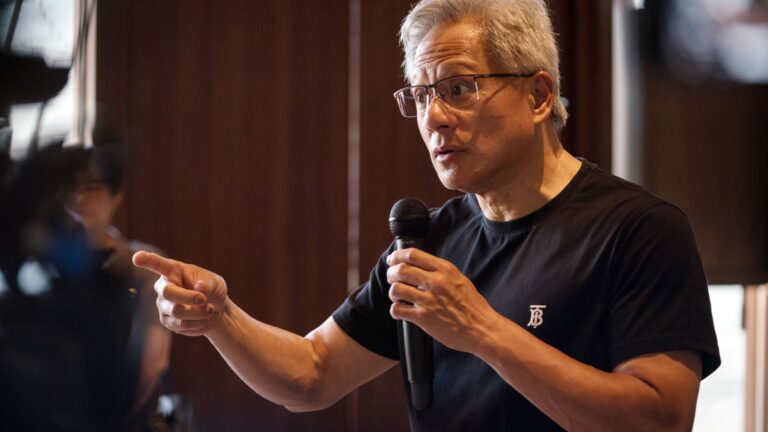Jensen Huang, chief executive officer of Nvidia Corp., speaks to members of the media in Beijing, China, on Wednesday, July 16, 2025.
Na Bian | Bloomberg | Getty Images
Nvidia is looking to ship more advanced chips to China than its current generation, CEO Jensen Huang said on Wednesday, as he looks to revitalize sales in the world’s second-largest economy.
The comments come after Nvidia said on Monday that it will resume sales of its H20 artificial intelligence chip to China, reversing a previous ban. The H20 is a less-advanced semiconductor designed for AI workloads that comply with U.S. export restrictions to China.
“I hope to get more advanced chips into China than the H20,” Huang said during a press conference in Beijing, China, in response to a CNBC question.
“And the reason for that is because technology is always moving on … today Hopper’s terrific but some years from now we will have more and more and better and better technology, and I think it’s sensible that whatever we’re allowed to sell in China will continue to get better and better over time as well,” he said referencing Hopper, Nvidia’s chip architecture that the H20 is built on.
Nvidia has been caught in the crosshairs of U.S.-China tensions over trade and technology. The tech giant has faced several rounds of restrictions that have forced it to restrict access of its most advanced chips to China. In response, Nvidia has developed semiconductors that comply with export restrictions, such as the H20.
Nvidia took a $4.5 billion writedown on the unsold H20 inventory in May and said sales in its last financial quarter would have been $2.5 billion higher without any export curbs.
Huang has trod a fine line between praising U.S. President Donald Trump’s policies regarding reshoring chip manufacturing to America while also lobbying for change on curbs to China.

The Nvidia boss has argued the Chinese AI market could be worth $50 billion in the next two-to-three years and that it would be a “tremendous loss” for American firms not to be part of that. Huang also told CNBC this year that Nvidia’s Chinese rival Huawei has “got China covered” if U.S. firms can’t participate in the market.
“Export control are things that are outside of our control and they can be quite disruptive to our business. It is our job only to inform the governments of the nature and the unintended consequences of the policies that they make,” Huang said during his visit to Beijing.
Nvidia has also laid out a roadmap to release more advanced chips, though it remains unclear if the U.S. government would allow Nvidia to sell more advanced products to Chinese companies. However, U.S. Commerce Secretary Howard Lutnick suggested on Tuesday that the government would continue to allow chip sales to China so that companies in the market rely on American technology.
“The idea is the Chinese are more than capable of building their own,” Lutnick told CNBC. “You want to keep one step ahead of what they can build, so they keep buying our chips.”

